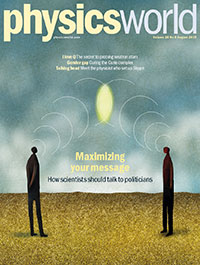By Matin Durrani
Mention the two words “science policy” and most physicists’ eyes will probably glaze over. Most of us dream of discovering a new planet or finding the Higgs boson – not poring over budget spreadsheets, championing science to politicians or commenting on legislation.
But science policy is vital in today’s world, which depends hugely on scientific research and in the cover feature of the August issue of Physics World, which is now out, Len Fisher and John Tesh offer 12 practical tips for scientists who want their ideas incorporated into science policy. You’ll be intrigued by what the two authors have to say.
Elsewhere in the issue, as my colleague Tushna Commissariat explains in the video above, there’s a great feature based on an interview with the French physicist Hélène Langevin-Joliot – the granddaughter of Marie Curie. In the article, Langevin-Joliot explains what’s known as the “Curie complex” and gives her own tips for scientific success. Langevin-Joliot didn’t suffer from the complex herself, but she acknowledges that it is a big problem for others and, these days, spends her time actively promoting careers for women in science
If you’re a member of the Institute of Physics (IOP), you can get immediate access to this special issue with the digital edition of the magazine on your desktop via MyIOP.org or on any iOS or Android smartphone or tablet via the Physics World app, available from the App Store and Google Play. If you’re not yet in the IOP, you can join as an IOPimember for just £15, €20 or $25 a year to get full digital access to Physics World.
 For the record, here’s a rundown of what else is in the issue.
For the record, here’s a rundown of what else is in the issue.
• Singapore banks on science – As Singapore celebrates 50 years of independence this month, science and innovation have become vital tools for driving economic growth. Susan Curtis reports from the city state in the heart of Asia
• Vatican and laureates warn of climate threat – In the wake of Pope Francis urging politicians to do more to combat global warming, a group of 36 Nobel laureates has called for similar action too, as Edwin Cartlidge reports
• Removing barriers – Elena Long argues that more needs to be done to support
physicists who are sexual and gender minorities
• Better science policy – An ambitious programme to improve science policy decision-making is 10 years old. Robert P Crease investigates
• I can’t help falling in Love with Q – Neutron star insides are describable only using very complicated theories. But as Matthew R Francis reports, it now looks like the outsides of these objects may be fully defined by only three simple quantities, known as I, Q and Love
• Curing the Curie complex – The French physicist Hélène Langevin-Joliot – the granddaughter of Marie Curie – talks to Tushna Commissariat about what’s known as the “Curie complex” and gives her own tips for scientific success
• Unique, but not exceptional – Tamara Davis reviews The Copernicus Complex: the Quest for Our Cosmic (In)significance by Caleb Scharf
• A very brief history of relativity – Cormac O’Raifeartaigh reviews Einstein’s Masterwork: 1915 and the General Theory of Relativity by John Gribbin
• A scientific tax man – It may not win him many admirers at parties, but for Paul Barton, helping companies claim tax credits for their research is a great way of combining his diverse interests in science and policy
• Once a physicist: Jaan Tallinn – Meet one of the founding engineers of Skype and a co-founder of the Centre for the Study of Existential Risk and the Future of Life Institute
• Spares and repairs – Mark Klimek bemoans the lack of recyclability of many modern goods
Trackback: I Love (you Susie) Q | physicsgg